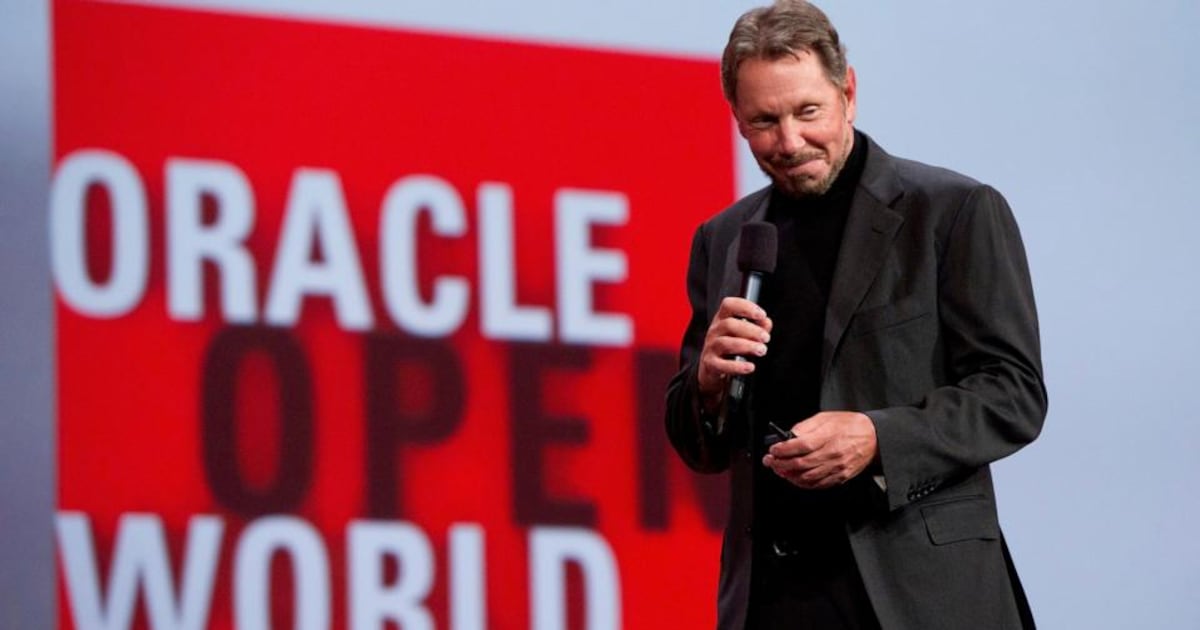Larry Ellison has overtaken Elon Musk to become the world’s richest person after Oracle’s shares surged by more than a third on Wednesday, propelled by the boom in artificial intelligence.
Mr Ellison’s stake in the software company, which he co-founded, soared to a value of more than $397 billion (€339 billion) on Wednesday afternoon.
This surpassed Mr Musk’s total net worth of about $384 billion, according to Bloomberg’s Billionaire Index.
Oracle chief executive Safra Catz hailed an “astonishing quarter” in quarterly results on Tuesday evening that included the group signing “four multibillion-dollar contracts with three different customers” in the three months to the end of August.
Those deals helped push Oracle’s bookings, which will feed through into future revenue, to $455 billion in the quarter, surpassing analysts’ expectations and up from $138 billion in the previous period.
The leap in Mr Ellison’s wealth comes as Mr Musk’s most valuable business, Tesla, is struggling amid a consumer backlash over the billionaire’s involvement with the Trump administration and investor concerns about the president’s cancellation of electric vehicle (EV) initiatives.
[ Ellison, Binance and Sequoia back Musk’s $44bn bid for TwitterOpens in new window ]
Tesla’s share price has fallen by a quarter since December. Mr Musk’s 16 per cent stake in the company is currently worth about $187 billion.
Oracle, which was late to pivot its business into cloud computing services, has benefited from a groundswell in demand for data centre infrastructure from AI start-ups and other major technology groups.
Wall Street had been primed for a rise in bookings following the disclosure of a new $30 billion-a-year contract Oracle signed in July, but had not anticipated such a steep increase in its book of future business.
This year, Oracle signed a deal to partner with OpenAI and SoftBank on the $500 billion Stargate project.
“An extraordinary $332 billion in bookings in Oracle’s Q1 represents not only the biggest bookings number we’ve ever seen in software, but a fundamental shift in the business model towards data centre operator,” said Keith Weiss, an analyst at Morgan Stanley.
Before Wednesday’s 42 per cent surge to $344, Oracle’s share price had already gained more than 40 per cent this year. Its market value rose from $678 billion to $967 billion in early trading on Wednesday.
Mr Ellison owns 41 per cent of the company’s shares.
On a call with investors on Tuesday, Ms Catz said Oracle had signed “significant cloud contracts with a who’s who of AI, including OpenAI, xAI, Meta, Nvidia, AMD and many others”.
Revenue from its infrastructure business would jump from $18 billion this year to $144 billion in five years’ time, she predicted. The forecast was nearly 60 per cent higher than the $91 billion Wall Street expected.
By comparison, revenue at Amazon Web Services, the biggest cloud company, topped $107 billion in its last full year.
The rapid growth has left Wall Street analysts questioning how Oracle will be able to add computing capacity fast enough to handle the new demand, at a time when most cloud companies have complained of chip shortages.
Rival cloud computing companies Amazon, Microsoft and Alphabet, along with Meta, are on course to spend more than $350 billion between them this year on data centres and other AI infrastructure, and more than $400 billion in 2026.
Oracle lifted its capital spending forecast for its fiscal year to the end of next May by $10 billion, to $35 billion. Ms Catz claimed the company was able to generate higher revenues with less capital spending than rivals because it does not invest in buildings and uses its computing equipment more efficiently. “I don’t want to call it asset-light . . . but it’s asset pretty light.”
Oracle has burst on to the scene as a significant player in the cloud market thanks to the heavy computing demands of training new AI models for a handful of customers.
But Mr Ellison said the surge in future demand reflected a shortage of computing to run AI models after they had been trained, known as inferencing.
“People are running out of inferencing capacity,” he said on the call with analysts. “The inferencing market is much larger than the training market.”
For the latest quarter, Oracle reported a 12 per cent gain in revenue to $14.9 billion, slightly below the $15 billion Wall Street had been expecting. Adjusted net income rose 8 per cent to $4.3 billion, higher than analysts’ expectations.
In July, it emerged OpenAI had agreed to lease 4.5 gigawatts of computing power from Oracle in a deal worth about $30 billion a year. The move will entail Oracle developing multiple data centres across the US to satisfy the start-up’s computer-processing demands, having already reached a deal to supply a 1.2GW site in Abilene, Texas. – Copyright The Financial Times Limited 2025

